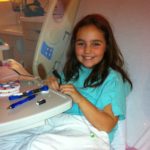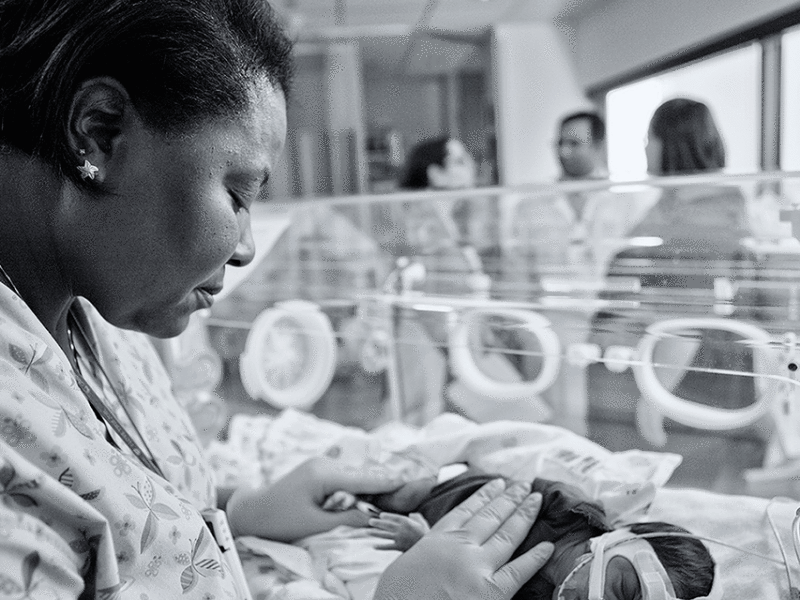Literature Review: Coping Through Narrative Medicine
Literature Review: Coping Through Narrative Medicine https://pediatricsnationwide.org/wp-content/uploads/2023/10/AdobeStock_610557297-1024x555.jpg 1024 555 Natalie Wilson Natalie Wilson https://pediatricsnationwide.org/wp-content/uploads/2021/06/Natalieheadshot3-2.png- October 13, 2023
- Natalie Wilson

Engaging with others’ stories helps prevent burnout among pediatric residents.
A recent publication in Annals of Medicine shows pediatric residents practicing narrative medicine reported sustained improvements in their perceived levels of stress, self-compassion, empathy, mindfulness, burnout and resilience. This marks the first study to demonstrate the value of a narrative medicine intervention in promoting lasting well-being among residents.
“Approximately half of pediatric residents in the United States report experiencing burnout during their training,” says Nimisha Bajaj, MD, PhD, who completed her pediatric residency at Nationwide Children’s Hospital in 2022 and is now a pediatric palliative care physician at Children’s National Hospital. Long work hours, financial stressors, exposure to patient death and other factors impact trainees. Without the right tools, she says, burnout, moral distress and compassion fatigue are significant concerns for medical professionals.
Research shows increased empathy, self-compassion, mindfulness, resilience and confidence in providing compassionate care are associated with lower burnout rates. However, many strategies that pediatric residency resilience and wellness programs have implemented do not directly target these qualities. In contrast, narrative medicine, which involves encouraging medical professionals to engage with, interpret and respond to stories that highlight relationships among physicians, patients, colleagues and society, has been shown to promote wellness, increase empathy and decrease burnout.
At Nationwide Children’s, Dr. Bajaj led a team to develop and evaluate a longitudinal narrative medicine intervention within the framework of relationship-centered care. The intervention, which took place over a five-month period in late 2020 and early 2021 and comprised six, one-hour video-conferencing sessions, aimed to improve residents’ empathy and mindfulness to enable enhanced self-compassion and resilience and reduce stress and burnout, with sustained effects beyond the intervention period.
Before each session, participants were assigned a short literary piece to read related to stressors the group identified. To decrease barriers to participation, reading selections gradually increased in length with each session, each was summarized during its respective session, all six sessions were offered twice and each participant received a journal and a copy of Paul Kalanithi’s memoir, When Breath Becomes Air, which served as the reading for the final session. During the calls, participants reviewed and discussed the assigned readings, responded to writing prompts and shared their reflections with their peers. Only residents were permitted at the sessions, and it was emphasized that the calls were intended to create a confidential, judgment-free “safe space.”
In survey responses, participants reported meaningful and persistent emotional and mental health benefits and noted that the intervention fostered a sense of community, facilitated personal growth, and improved empathy, self-compassion, and resilience. No statistically significant changes in quantitative metrics were observed compared to the control group, but study size was a limiting factor.
“Our study showed narrative medicine intervention can cultivate qualities associated with sustained reduced burnout among pediatric residents without requiring them to commit significant time or resources,” says Dr. Bajaj. “It also provides compelling evidence that narrative medicine interventions align with the principles of relationship-centered care, fostering genuine connections between physicians and patients.”
This article also appears in the Fall/Winter 2023 print issue. Download the full issue.
Reference:
Bajaj N, Phelan J, McConnell EE, Reed SM. A narrative medicine intervention in pediatric residents led to sustained improvements in resident well-being. Annals of Medicine. 2023;55(1):849-859. DOI: 10.1080/07853890.2023.2185674
Image credit: Adobe Stock
About the author
Natalie is a passionate and enthusiastic writer working to highlight the groundbreaking research of the incredible faculty and staff across Nationwide Children's Hospital and the Abigail Wexner Research Institute. Her work at Nationwide Children's marries her past interests and experiences with her passion for helping children thrive and a long-held scientific curiosity that dates back to competing in the Jefferson Lab Science Bowl in middle school. Natalie holds a bachelor’s degree in sociology from Wake Forest University, as well as minors in women's, gender & sexuality studies and interdisciplinary writing. As an undergraduate student, Natalie studied writing and journalism, engaged with anthropological and sociological research with a focus on race and ethnic relations, served as executive editor for the student newspaper, the Old Gold & Black, and gained marketing experience as an intern for a nonprofit entrepreneurial incubator, Winston Starts, as well as by working for Wake Forest University School of Law Office of Communication and Public Relations and its Innocence and Justice Clinic.
-
Natalie Wilsonhttps://pediatricsnationwide.org/author/natalie-wilson/
-
Natalie Wilsonhttps://pediatricsnationwide.org/author/natalie-wilson/
-
Natalie Wilsonhttps://pediatricsnationwide.org/author/natalie-wilson/
-
Natalie Wilsonhttps://pediatricsnationwide.org/author/natalie-wilson/
- Posted In:
- In Brief










